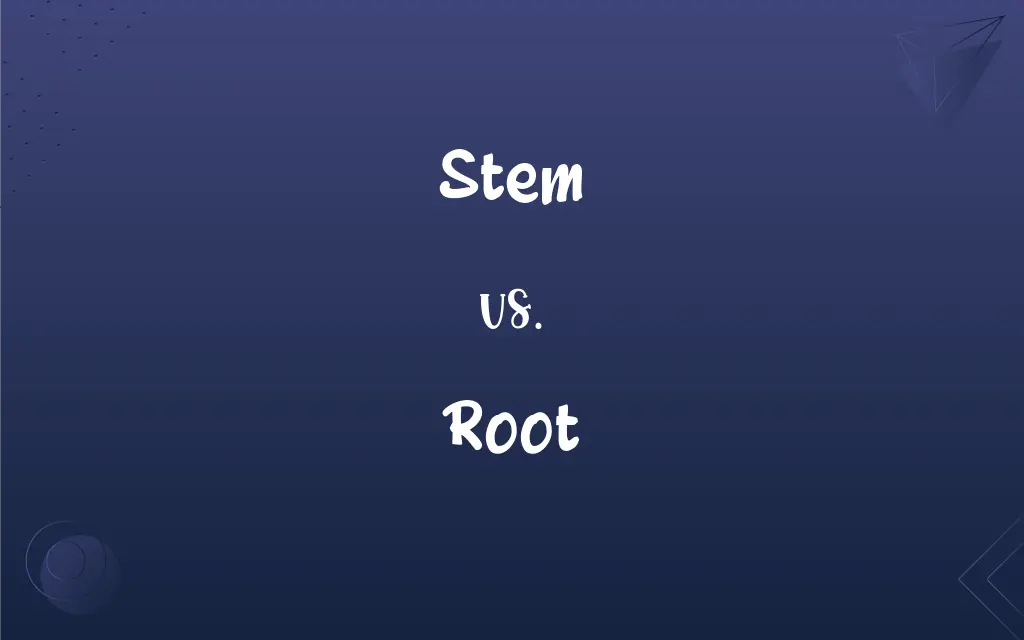Stem vs. Root: What's the Difference?
Edited by Aimie Carlson || By Harlon Moss || Updated on October 20, 2023
The stem is the plant's ascending part that supports leaves and flowers, while the root anchors the plant and absorbs nutrients from the soil.

Key Differences
The stem and root are fundamental components of plants, each having distinct roles and characteristics. The stem, often rising above the ground, is the main structural axis that bears leaves, flowers, and fruits. On the contrary, the root typically resides below the soil and serves as the plant's anchor, drawing water and essential nutrients from the ground.
In terms of function, the stem plays a crucial role in photosynthesis, as it holds leaves in optimal positions to receive sunlight. Additionally, stems facilitate the transportation of water, nutrients, and sugars between the roots and the rest of the plant. The root, however, is pivotal in providing stability to the plant. Through tiny root hairs, roots absorb water and dissolved minerals, which are then transported upwards to nourish the plant.
The morphology of the stem and root also varies. Stems exhibit nodes (points where leaves are attached) and internodes (segments between nodes). They can be herbaceous (soft) or woody in texture. Roots, on the other hand, lack these nodes and internodes and can manifest as taproots (a primary, dominant root) or fibrous roots (a dense network of similarly sized roots).
Stems and roots have adaptive capabilities that aid plants in surviving diverse environments. Some stems, like cacti, store water, enabling plants to thrive in arid conditions. Conversely, certain roots, such as those of mangroves, grow upwards, helping the plant respire in waterlogged soils.
To summarize, while both stem and root are integral to a plant's survival, the stem primarily supports and feeds the plant, whereas the root is essential for anchorage and nutrient absorption.
ADVERTISEMENT
Comparison Chart
Position
Above ground (typically).
Below ground (typically).
Main Functions
Support, transportation of nutrients, photosynthesis.
Anchorage, absorption of water and minerals.
Morphological Features
Has nodes and internodes.
Lacks nodes and internodes.
Types
Herbaceous, woody.
Taproot, fibrous root.
Adaptations
Can store water, photosynthesize.
Can stabilize plants, absorb nutrients, adapt to soil conditions.
ADVERTISEMENT
Stem and Root Definitions
Stem
A stem is the main structural axis of a plant.
The rose's stem was long and thorny.
Root
Roots anchor the plant firmly in the ground.
The oak tree's strong roots prevent it from toppling over.
Stem
A stem aids in the plant's reproduction through buds.
The stem's buds will soon blossom into flowers.
Root
A root is the part of a plant that typically lies below the soil.
The carrot we eat is actually the plant's root.
Stem
Stems bear leaves, flowers, and fruits.
The apple tree's stem was laden with ripe fruits.
Root
Roots absorb water and minerals from the soil.
The plant's roots take up nutrients essential for its growth.
Stem
Stems can store nutrients and facilitate growth.
The potato's stem, underground, is what we eat.
Root
A root can store energy in the form of starch.
The beetroot stores energy that can be consumed by humans.
Stem
The stem helps in transporting water and nutrients.
The plant's stem transports water from the roots to the leaves.
Root
The root system provides stability to the plant.
Deep roots ensure the plant's stability during storms.
Stem
The main ascending part of a plant; a stalk or trunk.
Root
The usually underground portion of a plant that lacks buds, leaves, or nodes and serves as support, draws minerals and water from the surrounding soil, and sometimes stores food.
FAQs
How do roots benefit plants?
Roots anchor plants, absorb water and nutrients, and sometimes store energy.
Can stems perform photosynthesis?
Yes, especially in green stems, they can photosynthesize.
What is the main function of the stem?
The stem supports the plant, bears leaves and flowers, and transports nutrients.
Why do stems have nodes?
Nodes are points on stems where leaves, branches, or flowers attach.
What are the tiny hairs on roots called?
They are called root hairs and aid in absorption.
What's a primary function of the root in desert plants?
In many desert plants, roots spread out widely to absorb sparse rainfall efficiently.
Do stems only grow upwards?
Most stems grow upwards, but some, like runners or rhizomes, grow horizontally.
Can roots store food?
Yes, some roots, like carrots and beets, store food in the form of starches.
Is bamboo a type of stem?
Yes, bamboo is a woody stem known as a culm.
How do stems help in plant reproduction?
Stems have buds that can grow into new plants or produce flowers leading to seeds.
Do roots respire?
Yes, roots respire, taking in oxygen from the soil.
Are all stems green?
No, while many stems are green, some, especially woody ones, are not.
Do all plants have deep roots?
No, some have shallow roots, while others, like trees, have deeper root systems.
Can some stems grow underground?
Yes, some stems, like tubers, grow underground.
What part of the plant do root vegetables come from?
Root vegetables, like potatoes and carrots, are derived from the plant's root.
Why are roots essential for tall plants and trees?
Roots provide stability, preventing tall plants and trees from falling over.
Can stems regenerate if damaged?
Many stems can regenerate or heal when damaged, depending on the extent and type of injury.
How do stems aid in plant survival during droughts?
Some stems store water, helping plants survive during drought conditions.
What's the difference between a taproot and a fibrous root?
A taproot is a main dominant root, while fibrous roots are a dense network of equally thin roots.
Can roots sense gravity?
Yes, roots exhibit gravitropism, growing in the direction of gravitational pull.
About Author
Written by
Harlon MossHarlon is a seasoned quality moderator and accomplished content writer for Difference Wiki. An alumnus of the prestigious University of California, he earned his degree in Computer Science. Leveraging his academic background, Harlon brings a meticulous and informed perspective to his work, ensuring content accuracy and excellence.
Edited by
Aimie CarlsonAimie Carlson, holding a master's degree in English literature, is a fervent English language enthusiast. She lends her writing talents to Difference Wiki, a prominent website that specializes in comparisons, offering readers insightful analyses that both captivate and inform.































































